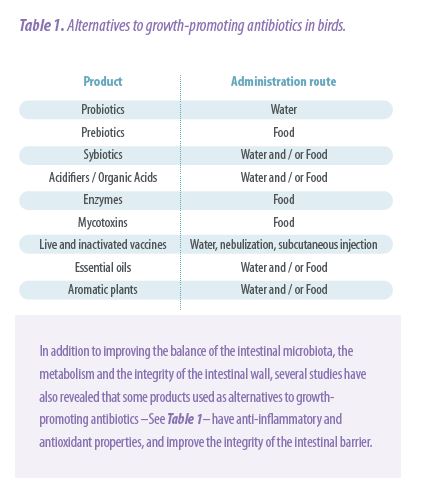Content available at: Español (Spanish) Português (Portuguese (Brazil))
Elimination of enteric pathogens from animal products intended for human consumption has become a priority due to the increase in the number of cases of toxic infections produced and in accordance with government regulations.
It has been estimated that foodborne infections in the USA cause over seventy-six million illnesses responsible for five thousand fatalities each year.
In addition, the annual economic loss attributed to the four most common enteropathogens (Salmonella spp., Campylobacter spp., E. coli and Shigella spp.) has been estimated to reach $ 7 billion dollars.
As a result, several methods to control foodborne pathogens have been implemented, including the use of antibiotics.
However, there is great concern about the widespread use of antibiotics in animal production leading to the emergence of antimicrobial resistance, and it also poses a potential risk to public health.
In recent years, substantial scientific evidence has shown that the use of certain antibiotics increases enteric colonization of antibiotic-resistant strains of enteric pathogens in domestic animals.
As a result, an increase in the rate and severity of these infections in food-producing animals as well as in humans has been reported in many countries around the world.
Antibiotics are ineffective in the treatment of multi drug resistant bacteria.
Equally frighteningly, is the fact that indiscriminate use of antibiotics can actually induce disruption of the intestinal microbiome, reducing the production of short chain fatty acids and increasing luminal pH in the distal gastrointestinal tract (dysbacteriosis).
In a recent study published in Frontiers in Veterinary Science -2016-, we evaluate the risk of infection with Salmonella Enteritidis -SE- or Salmonella Heidelberg -SH– associated with the use of Enrofloxacin in commercial birds, and we checked the effects of a probiotic as an alternative to antibiotics..
The results of this study, together with those obtained in previous studies focusing on other antibiotics and enteric pathogens, suggest that the prophylactic use of some antibiotics in poultry increases the susceptibility to salmonella colonization and organ invasion.
The use of antibiotics should be limited to the treatment of infections caused by a specific bacterium and with the antibiotic to which it is known to be sensitive.
Our findings also confirm the results of numerous studies, which suggest that the use of alternatives such as probiotics can be an effective tool for the control of salmonellosis.
Gut microbiota & antibiotic limitations
The microbiome plays a vital role in various physiological, immunological and metabolic activities of hosts. However, very little is known about possible mechanisms involved between bacteria and hosts in order to maintain their homeostasis in the gut.
Many factors including nutrient composition, stress and antibiotics can alter the microbiome.
Microbiome and its host, are working as one single organism. One of the fascinating aspects of this mutualism is the impact in the regulation of inflammatory responses.
Enterocytes, not only participate in digestion and absorption of nutrients, but they also participate as antigen presenting cells and regulates gut permeability.
The host’s intestinal epithelial cells provide both physical and chemical barriers to pathogenic bacteria through:
- Production of mucus from goblet cells
- Secretion of antimicrobial peptides from Paneth cells
- Production of IgA from plasma cells, forming intercellular tight junction complexes
- Recognition of microbe-associated molecular pattern.

Our understanding of several possible mechanisms involved in gut bacterial homeostasis should be widened in order to modulate their composition or treat diseases.
Microbiota balance
The fragile balance of the microbiota is influenced by many factors such as:
- Delivery method
- Age
- Dietary nutrient composition
- Infections
- Inflammation
- Stress
- Medication
It is therefore, not surprising to see that as a result of the indiscriminate use and abuse of antibiotics, the incidence of some food-borne pathogens such Salmonella and Campylobacter are increasing worldwide, with reports of antibiotic resistance in clinical isolates of these and other enteric pathogens.
Loss of effectiveness of antibiotics
The loss of effectiveness of antibiotics – the miracle drugs of the 20th century – has become an imminent danger to public health. Consequently, in 1997 the World Health Organization – WHO – published a list of antibiotics that should be reserved only for human use.
Consequently, the World Health Organization (WHO) published a list of antibiotics that should be reserved for human use only. Interestingly, soon after the publication of the WHO report, and with growing consumer and scientific pressures, the European Union went one step further, creating new legislations banning the use of all antibiotics as growth promoters as of January 2006.
Eleven years later, focusing on the concept of “One Health” as a way to combat antimicrobial resistance and to preserve antibiotics important to human medicine, the US Food and Drug Administration. USA –FDA– banned the use of antibiotics critical to human medicine as growth promoters and expanded the list of antibiotics for foods classified as veterinary drugs.

Currently, it is estimated that almost 50% of US poultry companies have eliminated the use of antibiotics – both growth promoters and preventively – in their production programs.
However, in some countries, the indiscriminate use and misuse of antibiotics are still a sad reality, particularly where there is no legislation regulating the use of antibiotic in animal agriculture.

Alternatives to antibiotics & field experiences
Over a century ago Eli Metchnikoff (1907) proposed the revolutionary idea to consume viable bacteria to promote health by modulating the intestinal microflora. The idea is more applicable now than ever since bacterial antimicrobial resistance has become a serious worldwide problem both in medical and agricultural fields..
Hence, the poultry industry has been evaluating the use of antibiotic alternatives. The most studied are: Probiotics (water application mainly lactic acid bacteria) or Direct-fed microbials, Bacillus spore based balance gut microflora.
Probiotics
Prebiotics are non-digestible food ingredients (readily fermentable sugars), that beneficially affect the host by selectively stimulating the growth and/or activity of one or a limited number of bacteria in the colon, and thus improve host health.
Most potential prebiotics are carbohydrates such as: Oligosaccharides
- Fructo-oligo-saccharides (FOS)
- Xylo-oligo-saccharides (XOS)
- Mannan-oligo-saccharides (MOS)
- Galacto-oligo- saccharides
Synbiotics refers to the appropriate combinations of pre- and probiotics.

Acidifiers / organic acids
Acidifiers/Organic acids include short chain fatty acids, volatile fatty acids and weak carboxylic acids that are only partly disassociated. They may play a role in maintaining gut integrity:
- Reducing the colonization of pathogens
- promoting the normal microbiome growth
- Increasing the efficiency of all digestive enzymes
Daily application of short chain fatty acids such as Butyric acids increases epithelial cell proliferation, quick repairing of the intestine, increased villous height and in turn increased absorptive capacity
Enzymes
Enzymes can improve digestibility, particularly of grains containing high levels of non-starch polysaccharides:
- Increase intestinal viscosity
- Favoring dysbiosis
- Reducing the absorption of nutrients
- Producing sticky feces and dirty eggs
Toxin binders
Toxin binders are used through feed to bind or adsorb deleterious substances such as mold and fungi-borne mycotoxins that have negative impact in the health of the host and the microbiome.
In recent years, live and inactivated vaccines have been used against Salmonella spp. in breeders to reduce the prevalence of infection and the risk of transmission.
Numerous studies and field experiences have shown that broilers from breeders vaccinated against Salmonella have a lower prevalence of salmonellosis at birth, during the growth phase and before processing.
Evidently, there is no such thing as a silver bullet. Rather, the combination of several of these nutraceuticals, accompanied with good husbandry and management practices oriented to improve biosecurity programs are becoming the new strategies incorporated in many companies.

The field experiences presented at a recent sectoral meeting – Sustainable Poultry Production, Production, Nutrition and Pharmacology Workshop 2017, Queretaro, Mexico – showed that broilers raised with an antibiotic-free program in Mexico had better performance, lower mortality and better relationship. costbenefits compared to conventional programs.
These broiler farms used live vaccines against coccidiosis, prebiotics, probiotics, organic acids, and essential oils. It also included a strict biosecurity program and free breeding stock of Mycoplasma spp. and Salmonella spp., and with strong maternal immunity against various diseases.
The experience of a Colombian company, comparing the costs of cage production versus cage-free farms, revealed that cage-free hens were healthier, produced more eggs / hen, and consumed less feed thanks to following a strict combined biosecurity program. with the use of probiotics, prebiotics, organic acids, essential oils, and vaccines against coccidiosis and Salmonella spp.
Under commercial conditions, chickens and turkeys are often born in challenging environments and where they are exposed to heat stress and potential pathogens in hatcheries. Stress, together with the abundance of pathogens in the incubator, provides the ideal conditions for colonization of the birds’ intestine with these microorganisms. To minimize this situation, several researchers have shown that in ovo administration of probiotics, prebiotics or synobiotics can have a significant impact on the development of a normal intestinal microbiota in birds.
Also, some researchers have confirmed the benefits of probiotics on innate and humoral immunity. In summary, the growing scientific knowledge and experiences in commercial production demonstrate that there are new viable and alternative methods for the production of healthy, antibiotic-free, safe and affordable poultry products.
PDF










